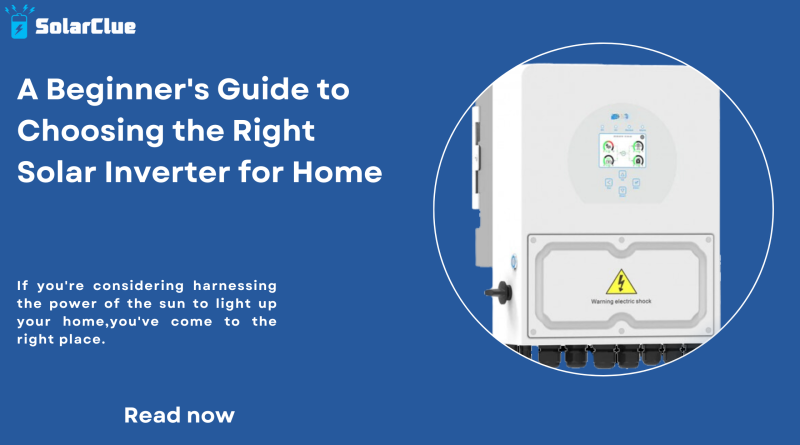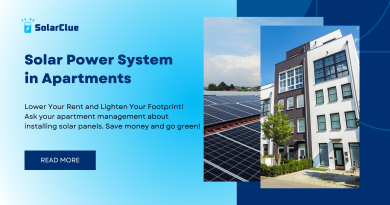A Beginner’s Guide to Choosing the Right Solar Inverter for Home
Welcome, future solar enthusiast! If you’re considering harnessing the power of the sun to light up your home, you’ve come to the right place. Today, we’re going to Simplify the world of solar inverters and help you choose the right one for your home. Whether you’re just starting out or looking to upgrade your solar setup, understanding Solar Inverter for Home is key to maximizing your solar energy investment.
Table of Contents
About Solar Inverters:
A solar inverter is like the brain of your solar power system. It takes the direct current (DC) electricity generated by your solar panels and converts it into alternating current (AC) electricity, which is what your home appliances use. But that’s not all! A good inverter also monitors your system’s performance, provides data on energy production, and can even shut down the system for safety reasons if needed. Pretty impressive for a box on your wall, right?
There are two main types of inverters you’ll come across: string inverters and microinverters. Technicians typically install string inverters in a central location to manage the output of multiple solar panels connected in a series (or string). On the other hand, manufacturers attach microinverters to each individual solar panel, offering more flexibility and potentially higher energy yields, especially in shaded or unevenly lit conditions.
Types of Solar Inverters :
Now, let’s look at the main types of inverters you might consider for your home:
1.String Inverters
These are the most common and typically the most cost-effective option. They’re called “string” inverters because they connect to a string (or series) of solar panels. They’re great for homes with simple roof designs and consistent sunlight exposure.
2.Microinverters
These little powerhouses are installed on each individual solar panel. They’re ideal for homes with complex roof designs or partial shading issues. While they’re more expensive upfront, they can maximize energy production and offer easier system expansion.
3.Power Optimizers
These are a hybrid solution. Like microinverters, they’re installed on each panel, but they work with a string inverter. They optimize the DC electricity at the panel level before sending it to the inverter for conversion to AC.
4.Hybrid Inverters
If you’re thinking about adding battery storage to your solar system (now or in the future), a hybrid inverter might be your best bet. These can manage both your solar panels and battery storage system.
Factors to Consider When Choosing a Solar Inverter :
Alright, now that you know the types, how do you choose? Here are some key factors to keep in mind:
1.Your Budget
Let’s face it, cost is always a factor. String inverters are usually the most budget-friendly option, while microinverters and power optimizers tend to be pricier. However, remember to consider long-term savings and efficiency, not just upfront costs.
2.Your Roof Design
If your roof is simple with consistent sun exposure, a string inverter might work perfectly. But if you have a complex roof with multiple angles or potential shading issues, microinverters or power optimizers could be worth the extra investment.
3.System Size
The size of your solar system will influence your inverter choice. Larger systems might benefit from multiple string inverters or a more powerful central inverter, while smaller systems could be perfect for microinverters.
4.Future Expansion Plans
If you think you might want to add more panels in the future, consider how easy it would be to expand with each inverter type. Microinverters and power optimizers often make expansion easier.
5.Warranty and Reliability
Look for inverters with solid warranties (usually 10-25 years) and good reliability ratings. Remember, your inverter works hard every day, so you want one that’s built to last.
6.Monitoring Capabilities
Many modern inverters come with sophisticated monitoring systems that let you track your energy production in real-time. If this is important to you, make sure to choose an inverter with robust monitoring features.
7.Efficiency
Check the efficiency ratings of the inverters you’re considering. Higher efficiency means more of the DC power from your panels gets converted into usable AC power for your home.
8.Brand Reputation
Stick with reputable brands that have a track record of quality and good customer service. Some well-known inverter brands include SMA, Fronius, Enphase, and SolarEdge, SolarClue® but there are many other good options out there.
Installation Considerations
Once you’ve chosen your inverter, installation is the next step. Here are a few things to keep in mind:
1.Location
Your inverter needs to be installed in a cool, dry place. Garages or shaded outdoor areas are common spots. Avoid areas with direct sunlight or excessive heat, as this can reduce the inverter’s efficiency and lifespan.
2.Accessibility
Make sure your inverter is installed in a place where you can easily access it for monitoring and maintenance.
3.Professional Installation
While DIY solar projects can be tempting, inverter installation is best left to the professionals. Proper installation is crucial for system performance and safety.
4.Local Regulations
5.Maintenance and Longevity
solar inverters generally require very little maintenance. However, it’s a good idea to visually inspect your inverter periodically and keep it clean and free from waste. Most inverters will last 10-15 years, so you may need to replace it once during the lifetime of your solar panels.
Conclusion :
Choosing the right solar inverter may seem like a difficult task at first, but with the right information, you can make an informed decision that aligns with your energy needs and budget. Remember, the solar inverter is a crucial component of your solar PV system, converting sunlight into usable electricity for your home. And there you have it! You’re now armed with the knowledge to choose the right solar inverter for your home. Remember, while this guide gives you a great starting point, it’s always a good idea to consult with a solar professional who can assess your specific needs and circumstances.
Visit SolarClue® to see the best Solar Inverters. SolarClue® actively sells solar energy products at discounts of up to 50% on its online marketplace.
So, here’s to brighter days ahead powered by solar energy! If you have any questions or want to share your own solar journey, feel free to reach out. Until next time, stay sunny and keep shining!


